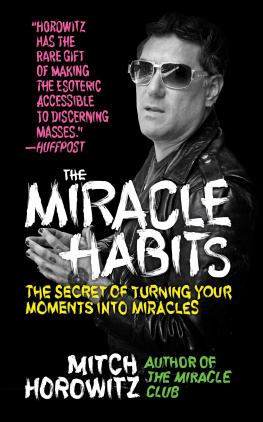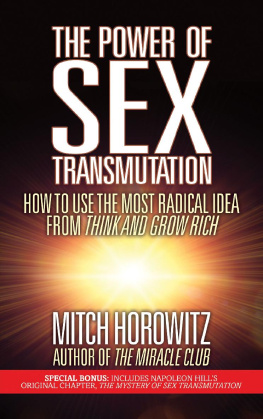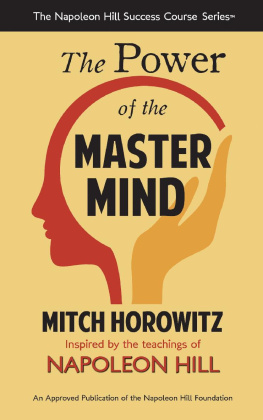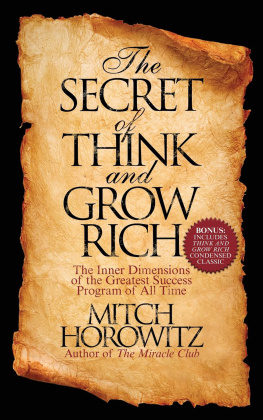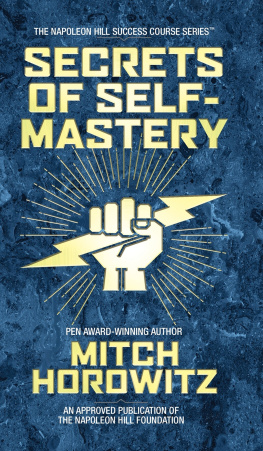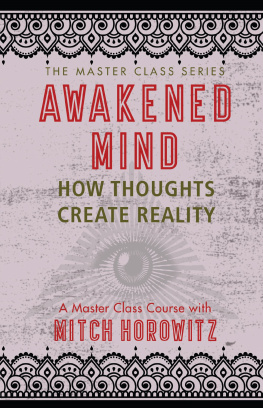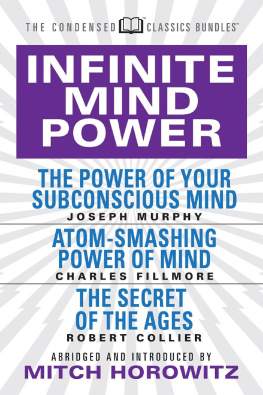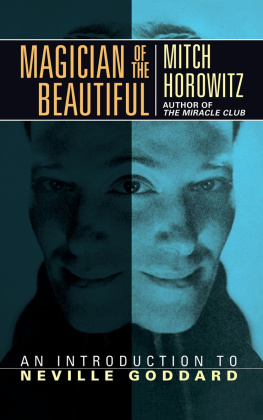Contents
Guide
Pagebreaks of the Print Version
ALSO BY MITCH HOROWITZ
Occult America
One Simple Idea
The Miracle Club
Uncertain Places
The Miracle Habits
Secrets of Self-Mastery
Cosmic Habit Force
The Miracle of a Definite Chief Aim
The Power of the Master Mind
Magician of the Beautiful
Mind As Builder
The Seekers Guide to The Secret Teachings of All Ages
The Miracle Month
Awakened Mind
DAYDREAMBELIEVER
UNLOCKING
THE ULTIMATE POWER
of YOUR MIND
MITCH HOROWITZ
author of The Miracle Club


Published 2022 by Gildan Media LLC
aka G&D Media
www.GandDmedia.com
Copyright 2022 Mitch Horowitz
No part of this book may be used, reproduced or transmitted in any manner whatsoever, by any means (electronic, photocopying, recording, or otherwise), without the prior written permission of the author, except in the case of brief quotations embodied in critical articles and reviews. No liability is assumed with respect to the use of the information contained within. Although every precaution has been taken, the author and publisher assume no liability for errors or omissions. Neither is any liability assumed for damages resulting from the use of the information contained herein.
First Edition: 2022
Front cover design by Tom McKeveny
Front cover photo by Ebru Yildiz
Back cover photo by Jacqueline Castel
Interior design by Meghan Day Healey of Story Horse, LLC.
Library of Congress Cataloging-in-Publication Data is available upon request
eISBN: 978-1-7225-2691-7
10 9 8 7 6 5 4 3 2 1
To Neville
My metaphysics are to the end of use.
I wish to know the laws of this wonderful power, that I may domesticate it.
RALPH WALDO EMERSON,
Powers and Laws of Thought
Contents
- Introduction
The Will to Create - Chapter One
The Power of a Single Wish - Chapter Two
School of War - Chapter Three
The Truth about Mind Causation - Chapter Four
Are We Gods in Our Own Realities? - Chapter Five
Time Travel - Chapter Six
Why Prayer Works - Chapter Seven
We Are Mighty - Chapter Eight
The Wish Machine - Chapter Nine
Mantra Magick - Chapter Ten
Determination - Chapter Eleven
Optimism of the Will:
Mind Power as a Philosophy of Life - Chapter Twelve
The Parapsychology Revolution - Interlude
The Bird-Lizard, a true story - Chapter Thirteen
What Do You Want? - Appendix
Depression and Metaphysics
Introduction
The Will to Create
What are all beliefs but the possibilities of I?
AUSTIN OSMAN SPARE, THE FOCUS OF LIFE
Several years prior to this writing, a famous political operativesomeone you would immediately recognize and perhaps be surprised byasked me to meet him at a suite in a posh Park Avenue hotel. I biked up from my then-home on Manhattans Lower East Side. As I settled into a sofa with my helmet in my lap, he asked me: Who is the best writer in New Thought? My questioner referred to the philosophy of positive-mind metaphysics that began in the transcendentalist ferment of New England in the mid-to-late 1800s and mushroomed across the nation.
Neville, I immediately replied, referring to Neville Goddard, one of the most intriguing mystical voices of the past century.
No, he said, ribbing meI didnt ask whos the coolest, I asked whos the best.
I repeated my assessment. The British-Barbadian Neville, whose career spanned from the late 1930s until his death in California in 1972, was a resplendent speaker who, under his solitary first name, wrote more than ten books on the limitless powers of thought. He has been my greatest influence. But I have differences with Nevilles ideas, which I do not believe cover the full gamut of human crises and mortality. I wondered then as I have other times: who could I recommend unreservedly?
Although I do not approve of the actions of the political figure who put the question to me, I nonetheless determined to allow it to serve as a personal goad. I decided right there to adopt it as my challenge to lay out a metaphysics of thought causation that shied from neither the sublime heights of possibility nor the severity of the barriers facing us. Ralph Waldo Emerson wrote in his journals of February 22, 1824: If Knowledge be power, it is also Pain.
Daydream Believer is the result of that effort. It deals with the interdimensional and infinite nature of your psycheby which I mean a compact of thought and emotionand also the paradoxical limits that create the tension of existence.
This book considers your psyches causative abilities, practically and theoretically; it responds to the ablest critics of mind-power metaphysics; it presents the evidence for extra-physical mentality, which is overwhelming; and it considers the role of ethics in thought causation. I equate ethics with reciprocity. And reciprocity, as I use it, is a wild force not to be understood as simple cause-and-effect between individuals but as part of a vast cycle of action and reaction within the human symmetry. Reciprocity must be approached with great care and acknowledgment of ones limited perspective.
My hope is that Daydream Believer takes the last 150 years of experimentation in New Thought to its sharpest peak and sets us on a path for the next stage. More importantly, I wish that the book shines a light for your own practice and experiments, frames mind-power as a meaningful response to life, and provides you with the tools to surpass its insights. If you find my claims bold, I trust that you will find my self-disclosuresnecessary for any honest reckoning of practical philosophyequally so.
What is the purpose of a spirituality of personal creation? All events that result from intention are reducible to the intention to increase power. Friedrich Nietzsche wrote those words in 18851886 in his notes to an incomplete and posthumously published book The Will to Power, as translated in 1967 by Walter Kaufmann and R.J. Hollingdale. Let me be plain: that is my driving principle in this book.
When people speak of pursuing truth, peace, understanding, freedom, justice, forgiveness, patience, or faith, they are indirectly identifying means to power: to the growth of their capacities for expression, attainment, and connection to the source of causation and creation. To argue against this framing inadvertently demonstrates its activity. Philosophies seek primacy.
Desire is a manifestation of power, wrote Wallace D. Wattles in The Science of Getting Rich in 1910. A leading light in New Thought, the socialist and metaphysical explorer belonged to an early and influential strain of positive-mind philosophers.
Indeed, I believe that a great deal of what gets defined or expressed as neurosis is the frustration of the power-seeking impulse in the individualnot power as brutality or force but as


